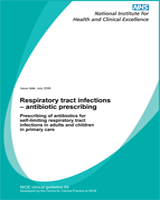All rights reserved. This material may be freely reproduced for educational and not-for-profit purposes. No reproduction by or for commercial organisations, or for commercial purposes, is allowed without the express written permission of the Institute.
NCBI Bookshelf. A service of the National Library of Medicine, National Institutes of Health.
Excerpt
Respiratory tract infection (RTI) is defined as any infectious disease of the upper or lower respiratory tract. Upper respiratory tract infections (URTIs) include the common cold, laryngitis, pharyngitis/tonsillitis, acute rhinitis, acute rhinosinusitis and acute otitis media. Lower respiratory tract infections (LRTIs) include acute bronchitis, bronchiolitis, pneumonia and tracheitis. Antibiotics are commonly prescribed for RTIs in adults and children in primary care. General practice consultation rates in England and Wales show that a quarter of the population will visit their GP because of an RTI each year (Ashworth et al. 2005). RTIs are the reason for 60% of all antibiotic prescribing in general practice, and this constitutes a significant cost to the NHS. Annual prescribing costs for acute cough alone exceed £15 million (Lindbaek 2006).
There is evidence from randomised placebo-controlled trials (RCTs) that antibiotics have limited efficacy in treating a large proportion of RTIs in adults and children (see section 2). These include acute otitis media (AOM), acute cough/acute bronchitis, acute sore throat/acute pharyngitis/acute tonsillitis, acute rhinosinusitis and the common cold. These conditions are largely self-limiting and complications are likely to be rare if antibiotics are withheld. Therefore, these five common RTIs are the focus of this guideline. The inappropriate prescribing of antibiotics has the potential to cause drug-related adverse events, escalate the prevalence of antibiotic-resistant organisms in the community and increase primary care consultation rates for minor illness (Standing Medical Advisory Committee 1998).
Contents
- Foreword
- 1. Summary
- 2. Evidence review and recommendations
- 2.1. Overview of the efficacy of antibiotics for RTIs in primary care
- 2.2. Antibiotic management strategies for RTIs
- 2.3. Identifying those patients with RTIs who are likely to be at risk of developing complications
- 2.4. Patients and parents/carers’ preferences regarding antibiotic management strategies for RTIs (no antibiotic prescribing, delayed antibiotic prescribing and immediate antibiotic prescribing)
- 2.5. Research recommendations
- 3. References, glossary and abbreviations
- 4. Methods
- 5. Contributors
- 6. Appendices
NICE clinical guidelines are recommendations about the treatment and care of people with specific diseases and conditions in the NHS in England and Wales
This guidance represents the view of the Institute, which was arrived at after careful consideration of the evidence available. Healthcare professionals are expected to take it fully into account when exercising their clinical judgement. However, the guidance does not override the individual responsibility of healthcare professionals to make decisions appropriate to the circumstances of the individual patient, in consultation with the patient and/or guardian or carer and informed by the summary of product characteristics of any drugs they are considering.
Implementation of this guidance is the responsibility of local commissioners and/or providers. Commissioners and providers are reminded that it is their responsibility to implement the guidance, in their local context, in light of their duties to avoid unlawful discrimination and to have regard to promoting equality of opportunity. Nothing in this guidance should be interpreted in a way that would be inconsistent with compliance with those duties.
- NLM CatalogRelated NLM Catalog Entries
- Respiratory Tract Infections - Antibiotic PrescribingRespiratory Tract Infections - Antibiotic Prescribing
- SUPT20HL1 SUPT20H like 1 [Homo sapiens]SUPT20HL1 SUPT20H like 1 [Homo sapiens]Gene ID:100130302Gene
- Introduction - Citing MedicineIntroduction - Citing Medicine
- CAPS2 calcyphosine 2 [Homo sapiens]CAPS2 calcyphosine 2 [Homo sapiens]Gene ID:84698Gene
- MAGEC2 MAGE family member C2 [Homo sapiens]MAGEC2 MAGE family member C2 [Homo sapiens]Gene ID:51438Gene
Your browsing activity is empty.
Activity recording is turned off.
See more...
